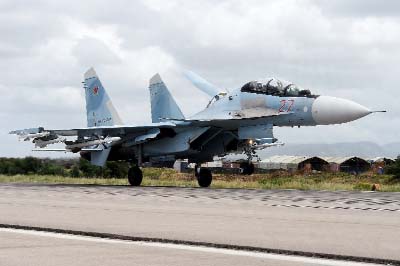
AFP, Istanbul :
Turkey on Friday said an accord with Russia to coordinate their air forces in Syria will prevent clashes between its warplanes and those of Russia and also the regime of Bashar al-Assad.
Ankara and Moscow have since the onset of the Syrian conflict in 2011 stood on opposite sides of the civil war, with Russia backing Assad and Turkey calling for his ouster.
But joint coordination efforts have intensified after Turkey and Russia patched up diplomatic relations strained by the shooting down of a Russian warplane over Syria by Turkish forces in November 2015.
Turkish Defence Minister Fikri Isik confirmed Russian statements that Moscow and Ankara had agreed to coordinate their air forces in Syria.
“The accord made with Russia includes coordination. Within this, the appropriate coordination will be made to ensure Turkish aircraft do not come into confrontation with those of Russia or the regime in Syria,” he said, quoted by the Anadolu agency.
Ankara has always vehemently denied any secret contacts with the Assad regime during the Syria conflict.
However, Turkish officials have on occasion acknowledged that Assad is a player who cannot be ignored in Syria and could potentially stay on in a post-war transition.
Russia and Turkey have spearheaded a shaky ceasefire in Syria, which Moscow and Ankara hope will lead to Syria peace talks in Kazakhstan beginning on January 23.
Both countries are active on the ground in Syria. Russia has been there since September 2015 to bolster Assad, and Turkey launched an incursion against jihadists and Kurdish militia on the border area in August 2016.
Moscow said Thursday Russia and Turkey signed an agreement spelling out mechanisms to “coordinate” their air forces in Syria when conducting strikes “on terrorist targets”.
Meanwhile, international investigators have said for the first time that they suspect President Bashar al-Assad and his brother are responsible for the use of chemical weapons in the Syrian conflict, according to a document seen by this news agency.
A joint inquiry for the United Nations and global watchdog the Organisation for the Prohibition of Chemical Weapons (OPCW) had previously identified only military units and did not name any commanders or officials.
Now a list has been produced of individuals whom the investigators have linked to a series of chlorine bomb attacks in 2014-15 – including Assad, his younger brother Maher and other high-ranking figures – indicating the decision to use toxic weapons came from the very top, according to a source familiar with the inquiry.
Turkey on Friday said an accord with Russia to coordinate their air forces in Syria will prevent clashes between its warplanes and those of Russia and also the regime of Bashar al-Assad.
Ankara and Moscow have since the onset of the Syrian conflict in 2011 stood on opposite sides of the civil war, with Russia backing Assad and Turkey calling for his ouster.
But joint coordination efforts have intensified after Turkey and Russia patched up diplomatic relations strained by the shooting down of a Russian warplane over Syria by Turkish forces in November 2015.
Turkish Defence Minister Fikri Isik confirmed Russian statements that Moscow and Ankara had agreed to coordinate their air forces in Syria.
“The accord made with Russia includes coordination. Within this, the appropriate coordination will be made to ensure Turkish aircraft do not come into confrontation with those of Russia or the regime in Syria,” he said, quoted by the Anadolu agency.
Ankara has always vehemently denied any secret contacts with the Assad regime during the Syria conflict.
However, Turkish officials have on occasion acknowledged that Assad is a player who cannot be ignored in Syria and could potentially stay on in a post-war transition.
Russia and Turkey have spearheaded a shaky ceasefire in Syria, which Moscow and Ankara hope will lead to Syria peace talks in Kazakhstan beginning on January 23.
Both countries are active on the ground in Syria. Russia has been there since September 2015 to bolster Assad, and Turkey launched an incursion against jihadists and Kurdish militia on the border area in August 2016.
Moscow said Thursday Russia and Turkey signed an agreement spelling out mechanisms to “coordinate” their air forces in Syria when conducting strikes “on terrorist targets”.
Meanwhile, international investigators have said for the first time that they suspect President Bashar al-Assad and his brother are responsible for the use of chemical weapons in the Syrian conflict, according to a document seen by this news agency.
A joint inquiry for the United Nations and global watchdog the Organisation for the Prohibition of Chemical Weapons (OPCW) had previously identified only military units and did not name any commanders or officials.
Now a list has been produced of individuals whom the investigators have linked to a series of chlorine bomb attacks in 2014-15 – including Assad, his younger brother Maher and other high-ranking figures – indicating the decision to use toxic weapons came from the very top, according to a source familiar with the inquiry.

